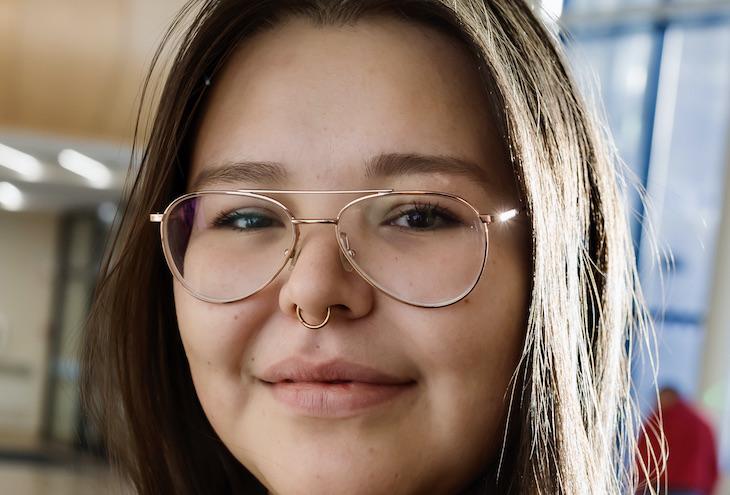I started out at the University of Saskatchewan in biochemistry. For that major, physics was a prerequisite. Although I had taken physics in high school, it wasn’t my favorite subject. I liked biology and chemistry, but the reading in those courses became overwhelming. Physics, on the other hand, included lab work. We learn theories, and then in the lab, we see those theories in action. That helped me understand the material better, and I decided to switch my major to physics.
When I was further along in my coursework, I made the connection that in Indigenous culture, learning has a history of being oral and land based. When I think of physics, that’s what I think of. Subconsciously, I knew that I learn best by seeing what’s being explained actually demonstrated. That’s how our people have always learned.
A weeklong summer course — the Canadian Astroparticle Physics Summer School — helped me pinpoint astrophysics as a field I’ll likely pursue at the graduate level. Another opportunity has been an internship with Canadian Light Source, a national facility for research in health, agriculture, environment, and advanced materials. My internship focuses on using data collected by the radio frequency cavity to see if the conditions are a good simulation of a comet orbiting in space. Understanding how changes in radio frequency or electromagnetic fields influence space surrounding Earth is fascinating to me. There’s so much to learn. I plan to see which universities offer astrophysics research projects for after I graduate in April 2022.
I grew up in Saskatoon, the largest city in Saskatchewan. I’m a registered member of English River First Nation, which is Dene First Nation on Treaty 10 territory. I am also Cree and Métis. I have two sisters and one brother and many extended family members, some as far away as Alberta and Scotland.
My family is matriarchal. I grew up encouraged to be an independent and strong Indigenous woman. My culture has given me a different way of looking at things, more of a holistic view. It’s also helped me think outside the box. Recently I’ve been spending more time learning about traditional knowledge, my culture, and my family’s history.
I’ve had the support of my family all along the way and they’ve always encouraged me to pursue my education. I’m never going to stop learning. It’s taken me longer to earn my bachelor’s degree because I didn’t know what I wanted to do with the rest of my life. But I took a few years off after high school — I wasn’t quite ready for college, and I think it’s important to go at your own pace. Your mental health has to be in good shape so you can focus on your studies.
As I progressed further into my degree, I didn’t feel homesick because my family lives in the same city, but I felt the effects of impostor syndrome — that feeling of self-doubt, like you don’t belong. It’s hard to overcome. In all honesty, I don’t think I’ve overcome it. I often feel like I don’t belong or I’m not as impressive as my peers. But caving in to those feelings won’t benefit anybody. Being an Indigenous Two Spirit woman in a career that barely has any women, let alone queer Indigenous women, can definitely be daunting, but that’s not going to stop me from overcoming barriers. After all, universities weren’t made for Indigenous people, they were made for white men, so feeling uncomfortable is inevitable. Having a place in these institutions is important in paving a path for our younger generation.
Becoming involved with AISES has helped me along my college path. A friend told me the university was going to help fund students who wanted to attend the AISES in Canada National Gathering, and I attended the one in Calgary and Montreal. Those conferences were my introduction to AISES, and it was such a beautiful experience. It was inspiring to see so many Indigenous professionals, and, in particular, Indigenous physicists.
AISES is starting to gain more of a presence in Canada and new chapters are forming at some of our universities. My friend Micheala Merasty and I started the USask AISES College Chapter, and I am the current president. We are looking to recruit executive members who can lead the chapter when we graduate.
I look forward to becoming a physics professor who can serve as a strong role model to Indigenous students. I know it would’ve been inspirational to have such a role model along my path, so that is my goal.













